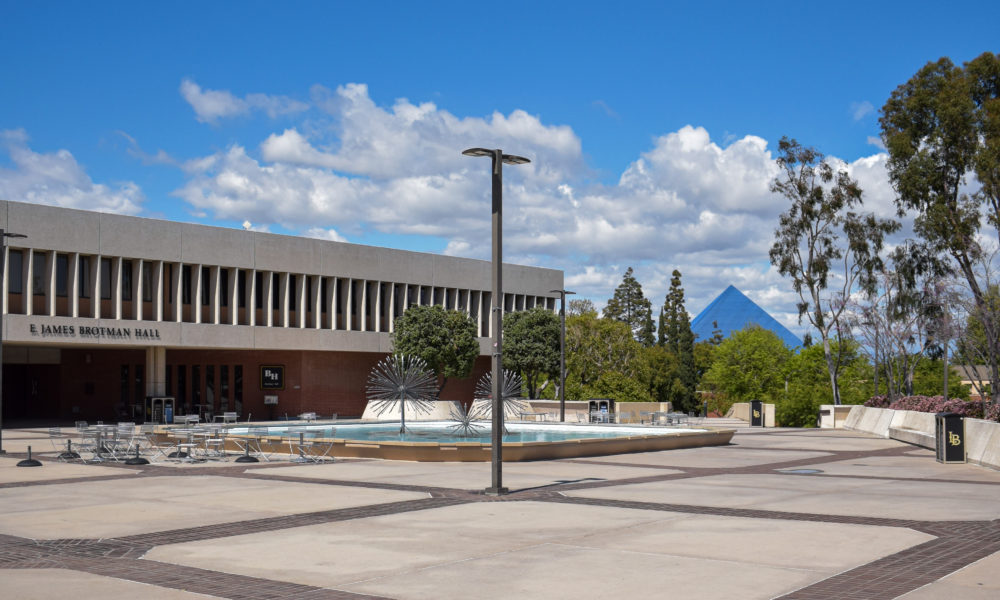The Sally Cassanova Pre-doctoral Scholars Program seeks to provide funding for students in the California State University System interested in graduate school and pursuing a doctorate. Scholars will also be provided with individual guidance from CSU faculty members as well as opportunities for career and professional development.
The 2020-21 scholars include 12 students from Long Beach State.
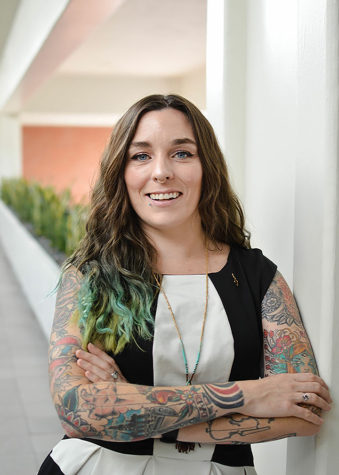 Taryn Williams, a fourth-year management and operations and supply chain management major
Taryn Williams, a fourth-year management and operations and supply chain management major
Taryn Williams is determined to not let her disadvantages define her trajectory or outlook as someone who has been through the foster care system, experienced homelessness, once used drugs and formerly incarcerated.
Instead, Williams, a fourth-year management and operations and supply chain management major, wants to use her grit and tenacity to push for change, which is how she has come to find her purpose and drive to pursue a business degree at Long Beach State.
As someone who was formerly incarcerated, Williams has seen firsthand how an entire population of people in the prison system have been shunted from the job market. The formerly incarcerated population has a 27% unemployment rate, which has been proven to contribute to the recidivism rate of around 37% nationally.
Williams has taken it upon herself to pursue research and make a case to businesses that providing opportunities for the formerly incarcerated is more than just a feel-good act, but is also something that will help their bottom line.
Williams said that the formerly incarcerated population’s success and hard work is oftentimes overlooked.
Currently, there is little-to-no data on how to change hiring practices or adjust higher education to accommodate students like Williams who want to reenter the workforce. She is planning to pursue a doctorate in management, where she hopes to advise companies and higher education institutions on how to fill those gaps.
But it hasn’t been an easy journey returning to school after a nine-year break. As a mother of twins, balancing school and raising children has been difficult for Williams.
“It’s for sure exhausting,” Williams said. “I want people to not assume that I’m some superhuman.”
Most days are spent taking care of her two children, McKayla and Isaiah, before putting them to bed at 8 p.m. Then, she studies until 2 a.m. and goes to sleep only to wake up at 6 a.m.
She said the Jewish community on campus has played an integral role in her ability to juggle everything she’s involved in.
“[They] pull [me] closer into culture and my sense of community, especially with having the kids,” Williams said. “I think especially having a Jewish community on campus has made college feel like a home.”
Everything Williams does is for her kids. She said that she has made many sacrifices, between raising them and pursuing her education, but she hopes that when they are older, they will recognize her desire to provide them with a better future.
Eventually, Williams hopes to return to higher education as a professor so that future college students will get to encounter diverse faculty. Williams hopes that after hearing her story, company leaders will reconsider rejecting an applicant solely based on their record.
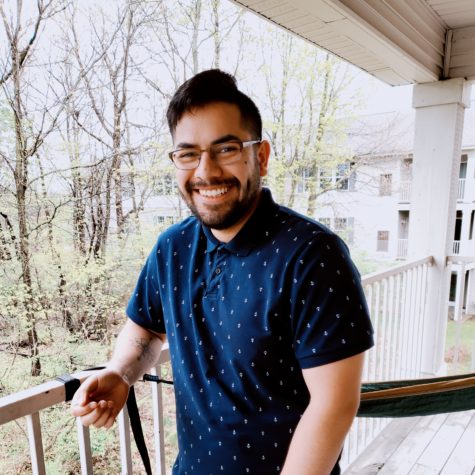
Cristien Arzate, a second-year graduate student majoring in physics
Cristien Arzate loves working with computers. To him, coding is like another language.
That’s why when he decided to major in physics and do research, he wanted to focus on computational research rather than experimental.
Arzate’s interest in astronomy began during his third year at Western Michigan University, when he began plotting data points for Manuel Bautista, a professor who was studying white dwarfs, a type of star.
This led him into his current graduate research at Long Beach State in astrophysics.
Now, Arzate works with Thomas Kläehn, an assistant professor studying the ultra dense matter of neutron stars and tries to measure the speed of sound through pressure modeling. The end goal is to learn more about the center of neutron stars and use physics to prove that neutron stars may have quark-gluon plasma.
Arzate also works with youth through the TRiO program at Western Michigan University.
Last summer, Arzate taught a coding course in Python to high school students from rural backgrounds and working farms, many of whom are the first in their family to attend college. .
Arzate’s parents were seasonal workers, and he knows that he’s pursuing a doctorate not only for himself, but also to demonstrate that individuals from underrepresented backgrounds can achieve their goals in academia.
“I want to honor my parents right by just working hard and chasing my goals as hard as I can,” Arzate said.
He especially wants to give back to the farm worker community that his parents are from.
Arzate is back home in Michigan taking CSULB courses online. Despite complications due to the coronavirus pandemic, he’s continued to make the most of opportunities like the Sally Casanova Pre-Doctoral Program.
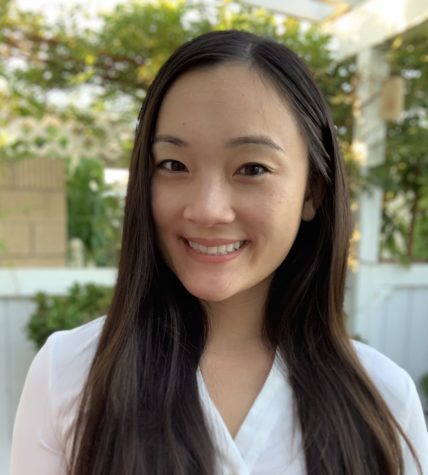
Lana Tran, a second-year graduate student majoring in early childhood education
Lana Tran once worked as a preschool teacher at a nonprofit organization as a Long Beach State undergraduate, providing services to students in foster care services or experiencing homelessness.
This experience sparked Tran’s drive to continue her graduate coursework to focus on the research and pedagogy of the best practices to offer support to teachers and policymakers setting up educational systems.
Tran has worked on several research projects at CSULB, University of California, Irvine and Boston University.
At CSULB’s Center for Evaluation and Educational Effectiveness, Tran worked alongside project director Erika Kato, evaluating the effectiveness of the Sí Puedo grant for Hispanic-serving institutions to target STEM performance for Latinx and low-income communities.
At UCI, Tran is part of the Individualizing Student Instruction Lab within the College of Education, where her research is focused on literacy development for students between kindergarten and third grade.
UCI’s research in early childhood education has helped Tran realize that she wants to prioritize applying for doctoral programs that value early childhood education. At the ISI lab, Tran worked under Carol Connor, a chancellor’s professor who died in May. Tran said she hopes to carry on the legacy of Connor’s work in children’s language and literacy development.
Tran studies inequities in the classroom at Boston University, learning how white students are given preferential treatment and how other students are disciplined.
Tran said she hopes to become a professor after receiving her degree.
“[Acceptance is] the value I’m going to ingrain into my teaching pedagogy,” Tran said. “And the field of early education has a lot to do with social-emotional intelligence.”
At times, Tran has self-doubt when she thinks about how funding for STEM often is prioritized over early childhood education. However, individuals like Jyotsna Pattnaik in the College of Education have encouraged Tran to apply for research opportunities, which helped her find her way into programs like the Sally Casanova Pre-Doctoral Program.
Tran said she hopes that as research expands for early childhood education, interventions backed by empirical evidence can help students reach their full potential early on.
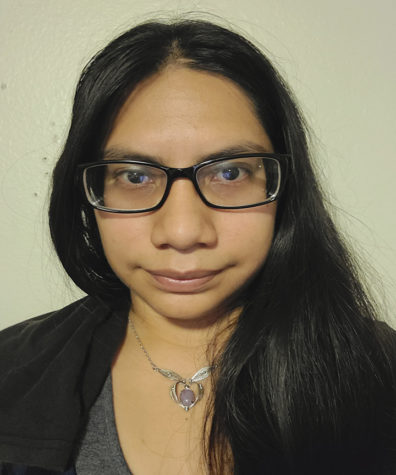
Lizbeth Jardon, a fifth-year biology and comparative world literature double major
Some might it find it surprising that Lizbeth Jardon has chosen to major in two fields that seem diametrically opposed, STEM and liberal arts. But that’s because it’s where she’s found her niche within the field of biology and conservation efforts in ecology.
When Jardon applied for the Research Initiative for Scientific Advancement, she had only taken one semester of science classes. Jardon had both her teaching assistant from her intro to biology course and a comparative world literature professor write her letters of recommendation.
Now in the program, Jardon, a fifth-year biology and comparative world literature double major, said that having opposite majors actually helped her application stand out. To the program director, she was a science, technology, engineering and mathematics major with the skills to communicate in reading and writing.
With RISE, Jardon works under Ted Stankowich’s Mammal research lab where she studies the musculature differences between coyotes that live in urban and rural areas. Jardon said that the research plays a practical role in helping humans interact safely with wildlife they may encounter.
However, Jardon didn’t always envision this future in higher education for herself. She felt isolated at times in her hometown of Garden Grove, sometimes being the only Mexican American student in her advanced placement classes in high school surrounded by Vietnamese American students.
“I just kind of took a look around the classroom,” Jardon said. “I was like, ‘There’s no one here who looks like me,’ and I feel like that really played a role in where I never realized how segregated some of the classes were.”
For Jardon, making her way in research is motivated by more than just her love for animals. She wants to break down the expectations and standards that society sets for women in her community.
“It’s just that there has been historically a lack of diversity,” Jardon said.
Jardon wants to show other students who are first generation students like herself that it’s possible to make it in this field.
“I feel like race was always sort of a predetermination of where you would end up in life,” Jardon said.
Jardon wants to come back to an institution like CSULB as a professor to mentor students and interact with the public on matters related to wildlife.
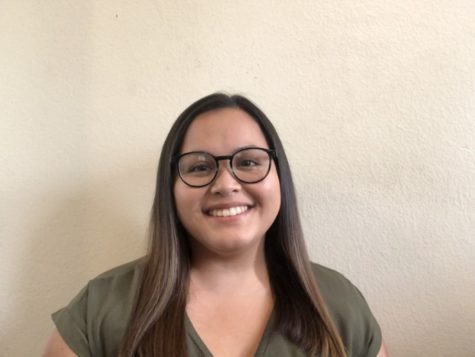
Alicia Castro, second-year graduate student in psychology
The jump straight from high school into Long Beach State’s dorms was difficult for Alicia Castro as a first generation student from a tight-knit family. She struggled to find her niche as a biology major, but then found her passion for psychology.
In her second year, Castro realized she needed research experience if she wanted to apply for a graduate program. Castro had to overcome a brief moment of fear when she reached out to her statistics professor, William Pederson, to ask if he had any research opportunities for her.
Pederson has now seen Castro grow throughout her undergraduate and graduate programs at CSULB. Now, she also works with her advisor and research mentor Bradley Pan-Weisz.
In her current research with Pan-Weisz, she’s studying first generation college student experiences, much like her own. The barriers for these students are not just changing students’ mindsets, she said, but are also changing the ways in which faculty and administrators interact with students to make themselves approachable and accessible.
She recognized that success for first generation students also means a chance to rise in socioeconomic status, but that can be difficult, she said, if students already feel they are behind.
“I grew up low income,” Castro said. “And when I went into the college community, I started realizing that not everybody came from that same background.”
She said she noted that the pressure mounts when there’s a feeling of competing with peers who have greater advantages.
Castro identifies as Latinx. Her community is mostly collectivist, which has contrasted her experiences in academia that oftentimes focuses instead on the individual.
She recognized that change is not easy and that institutions are reluctant to adjust their practices that have been working for so many years. She wants to be a part of the change in culture within higher education, which is why she plans on returning back to university as a professor.
“I just want to be a professor and a researcher at a university, and then be able to teach,” Castro said. “It is one of my biggest passions.”
Castro said she recognized the potential she has as a professor to mentor other undergraduate and graduate students. She wants to see universities where every student can succeed, regardless of their background.
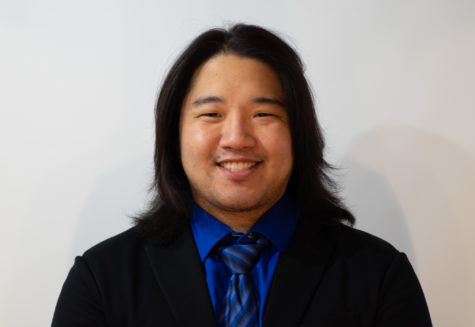 Everett Delfel, second-year graduate student and psychology major
Everett Delfel, second-year graduate student and psychology major
As a first generation college student, Everett Delfel’s higher education journey meandered before he found his calling in research.
“My parents were totally supportive, but they didn’t really know how to go about this stuff,” Delfel said. “‘You can do whatever you want. But we don’t really know how to help you.’ So that was the biggest piece of adversity.”
He didn’t declare psychology as his major until halfway through his third year as a criminal justice major at Long Beach State.
Delfel found his niche in studying human behavior and actions after taking a course in criminal justice theory with Robert Schug, a forensic psychologist.
Delfel has worked on several projects with multiple professors through his undergraduate and graduate career.
With Schug, Delfel’s research studied psychopathy, a personality disorder relating to criminal behavior. He has worked on studying the role of stress and cognitive aging within HIV positive populations with April Thames, a professor at the University of Southern California.
Due to the coronavirus pandemic, Delfel had to adjust all of his work with William Pedersen, a CSULB psychology professor studying social psychology, to online studies.
Juggling these different research interests has solidified Delfel’s appreciation for the expansive and multi-faceted opportunities within the research of psychology.
Delfel is now interested in neuropsychological assessments and neuroimaging. He said he hopes to eventually examine gray matter in the brain to evaluate what contributes to risky behavior.
“I’m just so fascinated that every part of us and our personality comes from the brain,” Delfel said. “We’ve been putting so much effort into trying to better understand it, but we’re still struggling. There’s still so much contradiction.”
While working with Thames, Delfel has interviewed test subjects and conducted MRI scans of their brains to draw a complete picture of these individuals.
Eventually, Delfel said he wants to come back to a university like CSULB to inspire and mentor other students. As a first generation student, he recognizes the value in having diverse faculty.
“In psychology, our goal is to create interventions to help people,” Delfel said.
He acknowledged that what might actually work as an intervention for one ethnic group might not work in another, and that there’s a variety of experiences from people he interacts with that he may not be familiar with. Delfel said it’s important to keep an open mind so that he can do his job properly to represent the experiences of his research subjects.
As a Korean-American, Delfel has also noticed a dearth of Asian American males pursuing the specific branch of clinical psychology. He wants to contribute to the destimagatization about mental health specifically in the Asian American community.
“Somebody could be searching for a psychologist, and they want someone from a similar ethnic background from them, or same gender or something like that, just because they feel comfortable with them and know that they can connect on some similar experiences,” Delfel said.
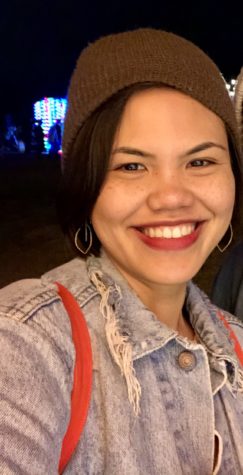 Grace Ocular, second-year graduate student in the College of Education studying dual language development
Grace Ocular, second-year graduate student in the College of Education studying dual language development
Grace Ocular began her journey in higher education as a human development major as a Long Beach State undergraduate. When she graduated in 2016, she took on other jobs for over three years.
Despite the busyness of her schedule, Ocular has continued to volunteer at Kimberly Kelly’s Child Language Interactions and Memory Lab, where she is the longest-serving research assistant since starting in 2015. She is now a graduate research fellow in the lab. Her work has focused on the language development of early childhood and parent-child language interactions.
Ocular said that her continued passion for this research comes from her own background as an immigrant.
“I came from the Philippines,” Ocular said. “I grew up there, and I moved to the U.S. at the age of 13 years old. So my academic experience has not always been easy. Language was a barrier in the beginning.”
She said she remembers taking remedial courses at the start of her college career and struggled throughout her education to catch up with her peers.
Individuals such as her research professor and mentor, Kimberly Kelly, an associate professor in the Department of Human Development and the principal investigator of the CLIaM research lab, was a huge supporter of Ocular and encouraged her to expand her expectations of her educational trajectory.
“Just her believing in my potential was something that sparked something in me,” Ocular said. “Like, ‘Oh, I didn’t [know], I can actually think about doing research.’”
As the first in her family to pursue a doctoral degree, Ocular feels that the support from her research professor and CSULB as a whole has played a large role in her success and ability to come back and pursue her masters after three years.
Ocular hopes to conduct research on multilingual families and how they interact with educational spaces.
She explains how the socioeconomic status of these families can bar access to informal learning environments such as museums and aquariums.
“I want to do research on those so that I can create a community or a bridge between informal learning institutions and these families that are typically left out of research in this field,” Ocular said.
Ocular has already started working toward exploring those ideas of educational success.
Since 2019, Ocular has contributed to institutional research as a graduate assistant for Beth Manke, interim dean of student success, evaluating the best practices to support student success as part of the Data Fellows program at CSULB. It has helped Ocular realize that her work can inform administrators and educators on how to better support students.
Ocular’s dream is to become a professor so she can help mentor students and support them in their journeys just like she was.
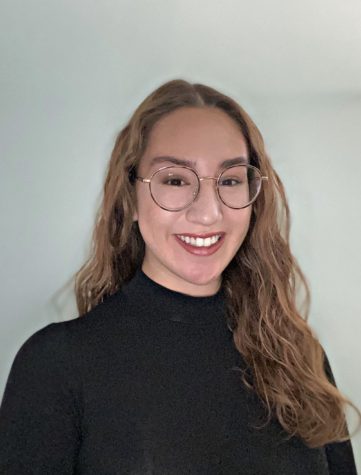
Kylie Foster, fourth-year psychology major
Kylie Foster knew since her first year in college that she wanted to pursue a doctoral degree.
That was affirmed when she fell in love with research in psychology.
Programs like Building Infrastructure Leading to Diversity catalyzed her progression in undergraduate research. Through BUILD, Foster met her research mentor Danielle Kohfeldt, who also helped her transition from studying social psychology to her current interest in neuropsychology with professor Yada Treesukosol.
Foster has taken advantage of another pre-doctoral program, the McNair’s Scholars Program, a federally funded TriO program aimed at supporting low-income and underrepresented students. She said that the directors, Keri Klima and Janette Mariscal, have played a critical role in helping her apply to Sally Cassanova and supported her growth as a student.
Foster said she loved the opportunity to dabble in both the quantitative and qualitative sides of psychology research.
“[What’s] really important to me is interdisciplinary research,” Foster said. “[If] you’re not getting the whole picture, you don’t understand what’s going on in the whole issue you want to look at.”
Foster said she eventually wants to study epigenetics, the impact of environmental factors on inheritable genes, to dive straight into the heart of the nature-versus-nurture debate.
She said she understands that there’s a lot of competition between experts’ views of nature or nurture being more influential in a person’s life, so she hopes to demonstrate that neither are mutually exclusive.
In spite of Foster’s large aspirations and hopes for the future, she said she still wants to stay grounded.
“I think it might be the fact that I’ve done so much already for being so young, that sometimes when I doubt myself, I kind of have this thought process of, ‘Kylie, you’re really young. If you stumble and if you make mistakes, that’s obviously going to happen,’” Foster said.
Foster said that she’s a workaholic and has been struggling to adapt to the new pace of an online workspace. She said it has helped her focus on her identity outside of school and the values that have made her successful as a student.
“I am a lot of things,” Foster said. “I am a first generation student, I am a woman in STEM, that means alot to me. I’m mixed, I’m Hawaiian, Japanese and Mexican. I also come from a very, like, low-income community and low-income family.”
With these identities, Foster acknowledged that the research field still has a lot more work to do to be inclusive. She said that research has shown that caring personally about this issue can add to bias, but it can also be a good thing.
“Research has to be personal for you to care about it in the way that you need to, for you to understand all the repercussions for people,” Foster said.
She said she feels it can be frustrating to see outsiders, who do research on ethnic communities, try to represent people they might not fully understand.
“Diversity in research really matters because only you and your community know what’s really going on in that community,” Foster said.
When Foster enters a doctoral program this fall, she will be 22, one of the younger members of her cohort. She isn’t an anomaly, she said, but rather one of many students of her generation who are interested in change.
“I feel like [older generations] had a very individualistic mindset when it came to higher education and resources and getting ahead,” Foster said. “I think this generation is way more focused on the collective, and I’m so proud of that and I’m so proud of all the programs that encourage that and allow us to to really build that up.”
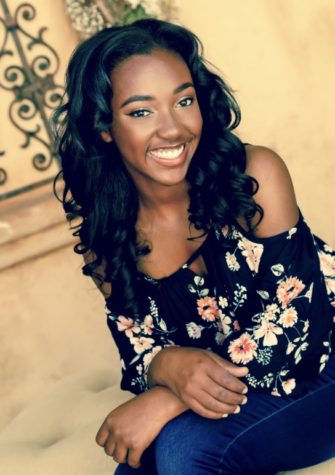 Kayla Landers, fourth-year chemistry major
Kayla Landers, fourth-year chemistry major
Kayla Landers hated chemistry when she was a sophomore in high school. As a straight-A student, this was the first time she struggled in a class. However, she grew intrigued by the challenge that this subject brought into her education.
“That struggle became motivation of, ‘I want to master this content. I want to be able to control chemistry instead of continually confusing me,’” Landers said.
Landers has struggled with perfectionism. In her first year of college, Landers was finally able to come to terms with the fact that she had anxiety. Landers failed her first test in her general chemistry class and remembered crying in the dorms.
However, science has forced her to embrace the lack of perfection in chemistry and in herself.
“I had always lived my life in a way that there was a clear-cut you’re good, or you’re bad, or like you’re smart, or you’re dumb, or you get it or you don’t. And science kind of forced me to live in this in-between state that I’ve never experienced before,” Landers said.
Her journey in research began when she took an organic chemistry course with Kensaku Nakayama. The subject intrigued Landers, and she found herself at Nakayama’s office hours, spending so much of her time that eventually she joined his research project.
Currently, Landers is studying asymmetric catalysis, which has the potential to alter the drug and pharmaceutical industry. Nakayama’s research lab is looking at ways in which organic chemists can manipulate the 3-D shape of drugs and ultimately the ways in which they interact with the body’s chemistry.
“If we do figure this out, this is something that really will streamline the drug manufacturing process,” Landers said. “It will make it a lot more effective, it will make it a lot more inexpensive, a lot more feasible. So it’ll be not just a breakthrough for organic chemistry, but it really can impact various different reactions in various different fields.”
Landers is enthusiastic about her research, but her biggest inspiration and joy comes from mentoring younger students. As a supplemental instruction leader, she has been able to help students who are working through some of the toughest general chemistry courses that are prerequisites to becoming a STEM, or science, technology, engineering, and math, majors. She’s been able to help students from underrepresented backgrounds see a path forward within their majors.
“I see many of them come into my classroom… with so much fear and so much lack of belief in themselves,” Landers said. “A common theme with all of us is we’ve never seen someone like us do it.”
Landers knows that representation is more than just the numbers schools tout as diversity quotas in their programs. As a Black woman making her way through the field of chemistry trying to pursue a doctorate, she has never had a Black teacher throughout her educational experience.
“I think it’s more than just having a couple token, underrepresented students to say that we’re diverse,” Landers said. “I think it’s creating a culture that not just invites the students in but also makes the students comfortable when they inhabit the space.”
There have been professors who have been supportive of Landers throughout her journey at CSULB, but none have directly addressed the intersection of her identities, and she wants that to change. Landers said that her goal at the end of her career is to become a professor and to normalize seeing a Black professor teaching subjects like chemistry.
“Diversity has become a word that is used a lot now,” Landers said of higher education. “It’s kind of like a trend, ‘we’re very diverse.’”
Her hope is that academia will support students of color beyond the ‘trend of diversity’ to make sure that these students thrive and that systems of support can be created to ensure their success.
Landers said she notices that it’s sometimes easier for educational spaces to not address the disparities.
“Let me be very clear. I want to be seen,” Landers said. “I do not exist to be invisible.”
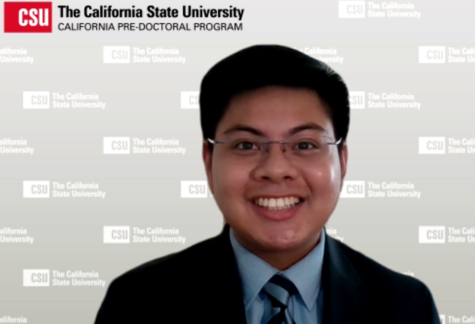
Joshua Acosta, fourth-year history major and religious studies minor
Like many other freshmen in college, Joshua Acosta was trying to find his niche as he took classes across multiple majors in his first year. Ultimately, he found that history was his main passion.
Acosta remembers an oral history project that filled him with inspiration.
“I had the opportunity to interview my grandmother,” Acosta said. “And I knew she came from the Philippines. I knew that she studied nursing but didn’t really know the specifics.”
Learning about his grandmother’s journey helped Acosta realize that immigrant stories of resilience and overcoming hardship were the narratives he wanted to study.
His professor, Guotong Li, saw potential in him during his first upper-division history class in the fundamentals of research and encouraged him to apply for the annual CSULB Student Research Competition.
Although Acosta didn’t win, he said that his appreciation for research grew that day, falling in love with the process of speaking for his work and getting grilled by the competition’s judges.
He went on to apply for his first pre-doctoral program through the Mellon May’s Undergraduate Fellowship Program and then the Sally Casanova Scholarship.
For his doctoral degree, Acosta said he wants to explore Asian-American history, specifically, its role in the construction of U.S. history. He said it’s more than just diversity and that these stories invite people who have been left out of conversations “into the collective effort to reshape a lot of systemic disparities that we see today.”
These stories, he argued, play an integral role in battling today’s struggles with “racial violence… xenophobia, and nativism and hateful rhetoric.”
The research Acosta plans to explore will focus on the Filipino labor and migrant communities on the West Coast. He said he wants to examine how communities process cultural solidarity and “what it means to be American,” and more specifically, what it means to be a “hyphenated American.”
While the coronavirus pandemic has shifted in-person research conferences online, Acosta said that, in the grand scheme of things, he’s found joy in the fact that his research is now more accessible virtually.
He encourages other undergraduates to seek out research opportunities even if they might not want to pursue a career in academia. Acosta said that the research skills he gained can help other students pursue careers ranging anywhere from social activism to the medical profession.
“I think sharing scholarship is an important part of why I want to pursue this because, as I said, including people in these discussions makes it more enriching and valuable,” Acosta said.
Joshua’s research was just recently presented at John Hopkins University’s Macksey Symposium.

